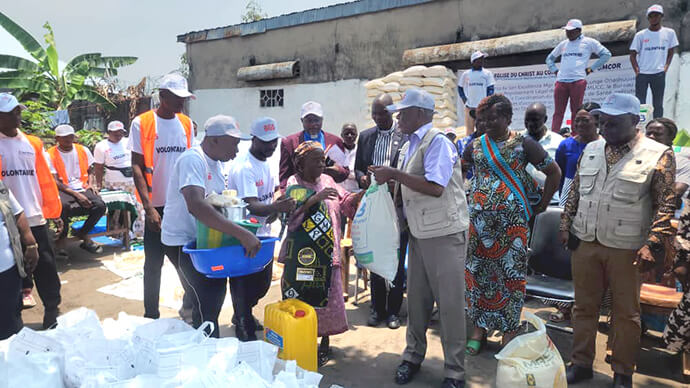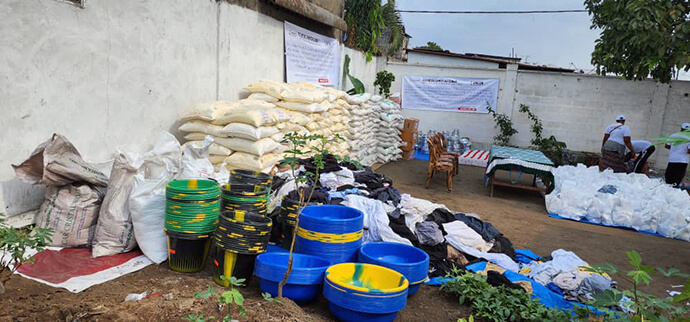
Key points:
- With financial support from UMCOR and Global Ministries, the church distributed food, medicine and other supplies to affected families in central Congo.
- Bishop Daniel O. Lunge, resident bishop of the Congo Central Conference, praised the collaboration between the conference, local authorities and Global Ministries.
- Émile Odimba with the church’s disaster management office said the church plans to raise awareness in local communities to help prevent future disasters.
The United Methodist Church has provided food and other assistance to flood victims in Kinshasa, the capital of the Democratic Republic of Congo.
At the beginning of last year, Kingabwa — a district located to the north of Limete Commune — was severely affected by the flooding of the Congo River, which reached record levels. The Kingabwa Grand-Monde district was particularly hard hit, forcing many residents to evacuate. Some 3,500 people lost their homes.
“Many homes were devastated by the waters, and roads were blocked by the floods,” said Émile Odimba, coordinator of the United Methodist Committee on Relief’s disaster management office for the Central Congo Episcopal Area.
At least 55 people were killed, according to a report sent to the French Press Agency by General Sylvano Kasongo, chief of police in the capital.
With a $177,831 grant from UMCOR and the Global Health program of the United Methodist Board of Global Ministries, the church distributed 46 tons of food, hygiene products and medicine to about 3,000 people.
Gabriel Dikete Utshudi, coordinator of the church’s Central Congo Health Department, reported that the donations covered essential needs.
“Each household received a bag of semolina (wheat flour), a bag of rice, a tin of oil, a complete kit of saucepans, salt, soap, sugar, a piece of loincloth, mosquito nets and a kit of medicines,” said Dr. Samuel Longanga, head of the Malaria Control Program. “These material aids have considerably eased the daily lives of the affected families, who are often faced with precarious living conditions.”
Hélène Dikomba Dihandjo, a beneficiary, expressed her deep gratitude to The United Methodist Church. “I’m not a Methodist, but I was touched by their generosity. Thanks to them, I can feed my children again.”
Cadidja Kikumba, a 20-year-old woman who lost her parents in the floods, underlined the difficult living conditions of those affected. “We live in inhumane conditions. The church is the only organization that has really helped us.”

Martin Mukendi, a person living with a disability, was surprised by the scale of the aid.
“I thought this donation came from the government, but it was The United Methodist Church that organized everything.”
Bishop Daniel O. Lunge, resident bishop of the Congo Central Conference, emphasized the importance of the church’s action beyond the spiritual dimension.
Subscribe to our
e-newsletter
“The church’s responsibility is to care for souls, but also for their bodies. We wanted to provide a concrete response to this humanitarian crisis,” he said. He also praised the collaboration of the conference, local authorities and Global Ministries.
“This fruitful collaboration enabled us to respond rapidly to the urgent needs of the victims,” Lunge said.
The Rev. Attaché Lotengo said the church’s initiative is an example of solidarity and compassion. “It demonstrates that churches can play an essential role in humanitarian aid and community development.”
Despite the help, Kingabwa’s flood victims expressed their fears for the future. The recurrent rains and the lack of sustainable measures to prevent flooding are worrying.
Odimba, with the church’s disaster management office, said the church plans to carry out awareness-raising activities in local communities to prevent future disasters.
“We plan to sensitize the chiefs of the respective communities so that they, in turn, can continue raising awareness in their communities,” Odimba said.
Longanga said educational sessions also were held for beneficiaries of the aid on the correct use of the medicine kits, as well as proper handwashing techniques.
Bishop Lunge called on the beneficiaries to make good use of the donations received.
“May God bless you abundantly,” he said.
Okito is director of communications for the Central Congo Episcopal Area.
News media contact: Julie Dwyer, news editor, [email protected]or 615-742-5469. To read more United Methodist news subscribe to the free UM News Digests.



